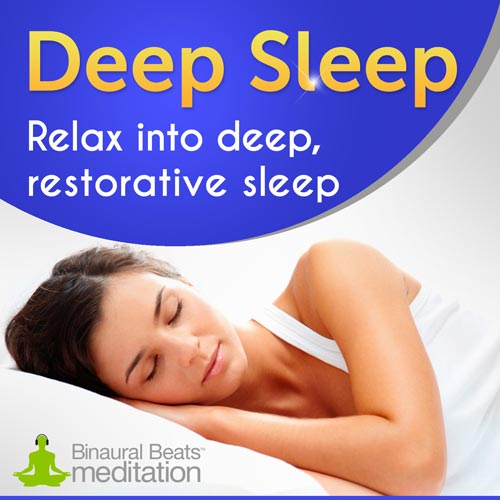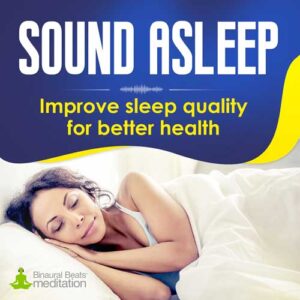Binaural Beats Sleep Guide: Science, Effectiveness, Best Practice Use
We're becoming an increasingly sleepless world. 1 in 3 adults don’t get enough sleep, and 8.6 million Americans report taking prescription sleeping aids.
Ill-health is a cause of poor sleep, but the biggest factor in people not sleeping properly is stress and anxiety.
We are busier than ever: To make ends meet we are working increasingly long hours, and at the same time trying to keep up with family commitments.
We are tired. Period.
Thoughts of ” I can't wait to get into bed tonight” and “I wish I could take a nap now” cross our minds through the day.
But for many of us, when we do eventually get into bed, our minds are still racing from the day's activities and thoughts of projects, money concerns, and relationship worries.
The brain just won't wind down, and these spinning thought processes stop us from falling asleep quickly, and may wake us up during the night after we do fall asleep.
The good news is that there is another option to over-the-counter medication, and it comes in the form of wellness audio technology – binaural beats.
In this post, not only will we introduce you to our special binaural beats music to help you sleep better, and explain how brainwave entrainment works, but also give you some other tried and tested methods for a better night's sleep.
It’s a two-way street: Stress and anxiety can cause sleeping problems, or worsen existing ones. But lack of sleep can also cause an anxiety disorder. ~ Sleep Foundation
Contents:
- What are Binaural Beats?
- How Do They Help You Sleep?
- How to Use the Audio?
- Research Studies & Efficacy
- 7 Other Ways to Improve Sleep Quality
- Summary
What Are Binaural Beats?
Binaural beats are an auditory phenomenon capable of moving the brain into different positive states, be that to lower anxiety, improve focus, or help you fall asleep.
To listen you require headphones. Two frequencies are sent to the ears, one to the left and one to the right.
When your brain receives these frequencies it triggers a process called Frequency Following Response (FFR).
This means the brain begins following along at a particular frequency, which is the mathematical difference between the two frequencies sent to your ears.
For example, if a 210 Hz frequency is sent to the right ear, and a 204 Hz frequency is sent to the left ear, the brain follows along at the difference between the two, which in this example is 6 Hz.
As it follows along the brain produces brainwaves at that frequency, and as a result the brain shifts into a new state.
We have a more in-depth article on how this works here.
How Do Binaural Beats Help You Sleep?
There are different brainwave states. Beta waves, for example, are high-frequency waves and produced by the brain when we are in a state of high energy such as mental problem solving or physical activity.
At the opposite end of the spectrum, Delta frequency brainwaves are low-frequency waves, and are the dominant brainwaves when we sleep, particularly in the latter, deeper stages of sleep.
When we want to sleep, we want the brain to be producing low-frequency brainwaves, so that we can feel calm and relaxed and comfortable.
Listening to Delta frequency binaural beats music prior to sleep will help initiate the production of the low-frequency Delta brainwaves.
The music entrains your brain to produce Delta waves, calming an overactive mind and resulting in a deeper, more restful sleep.
A delta wave is a high amplitude brain wave with a frequency of oscillation between 0.5–4 hertz. Delta waves are usually associated with the deep stage 3 of NREM sleep, also known as slow-wave sleep (SWS), and aid in characterizing the depth of sleep (Source; Wikipedia)
How to Use Binaural Beats for Sleep?
We get a lot of enquiries asking the best way to use binaural beats as a sleep aid.
There are two options:
- Listen up to an hour before you sleep.
- Fall asleep listening and carry on listening while you sleep.
Option 1:
If listening prior to sleep, you will want to create an environment conducive to relaxation. By that I mean reducing stimulation. For example, stop working and turn off your computer, stop scrolling on your phone, and don't engage in physical exercise.
This is part of what we call good sleep hygiene; actions that contribute to a better night's sleep.
You can choose to read in low light, sit back and ponder/ or meditate, or start your bedtime routine of getting change and washing you face and cleaning your teeth. All of this can be done while listening.
Once you feel deeply relaxed and tired, get into be as normal.
You don't need to change your routine or the time you sleep, in fact it is good to keep this the same – if it is a healthy routine that is (see more sleep tips later down the page).
Option 2:
You can also listen while you fall asleep. In this case it is best to use sleep headphones, which wrap around your head like a headband and provide a more comfortable experience that sleeping with headphones on or earbuds in.
Please note that some of our users leave the sleep tracks on repeat, so that they play all through the night. If you do this, please keep the volume low to protect your ears.
Of course, you can combine the two methods by starting to listen prior to bedtime and continuing to listen while you fall asleep.
Research Studies & Efficacy
But does it really work?
The answer is yes. We have hundreds of thousands of users the world over using our special music as a sleep aid, and scientific research is backing up what we already know.
Study 1:
In one research study, elite soccer players were stimulated for eight weeks during sleep with binaural beats at around 2-8 Hz.
Once a week after wake-up, participants completed three different questionnaires: a sleep diary, an adjective list for psychophysical and motivational state, and a self-assessment questionnaire for sleep and awakening quality.
The results of the study showed that “Eight weeks of auditory stimulation with binaural beats improved perceived sleep quality and the post-sleep state of athletes (1).
Study 2:
In another study, researchers found that listening to 3 Hz (Delta) binaural beats improved deep sleep by extending this critical stage of sleep.
The study results concluded:
This increased N3 duration was induced by the 3-Hz binaural beat, as was clearly observed by the comparison of the change in the control group at the same time-point, night 3 compared with night 2. This comparison was conducted to confirm that this effect was indeed the effect of the stimulus, not the effect of habituation to the surrounding environment (2).
Study 3:
Additionally, a study that tested binaural beats on daytime napping found an increase in sleep stability (3)
Study 4:
Another study that combined theta frequency binaural beats and ASMR found that the “auditory stimulus could induce the brain signals required for sleep, while simultaneously keeping the user in a psychologically comfortable state (4).
Study 5:
Finally, a study that looked at the effect of binaural beats on insomnia sufferers, aged 20-59 years, over a 2-week period, found that “exposure to music with BB is likely to reduce the hyper-arousal state and contribute to sleep induction”. (5)
Remarkably, some of the research here used Theta frequency binaural beats tracks, which is a higher frequency than the Delta frequency range that is ideal for sleep entrainment. This goes to show that both Theta and Delta binaural beats track can assist in deep relaxation, lower anxiety, and subsequent improved sleep.
7 Other Ways to Improve Sleep Quality
Listening to binaural beats audio isn't a magic solution for those with serious sleep problems.
It will help, for sure, as we have seen from the research cited above. However, you should follow a good sleep hygiene routine to improve sleep quality.
A good sleep routine starts with going to bed and waking each day at a similar time.
Having a regular bedtime means that your brain will identify when it's time to sleep and begin to produce the chemical melatonin. Melatonin makes you feel sleepy and ready for bed.
If you go to bed at very different times each night, your brain will be confused as to when it is supposed to sleep.
Here are some useful tips to improve your sleep routine, which you can combine with your audio entrainment.
1. Exercise during the day
Exercise is a scientifically-proven sleep promoter, but make sure you complete exercise at least three hours before you want to go to sleep.
Some people can go from exercise to bed without any trouble falling asleep, but others will find that it takes longer for their adrenaline to settle down and their mind to stop racing.
You may also want to eat after exercise, and for that you should leave at least two hours for digestion before attempting to go to sleep.
2. Take time to wind down
As mentioned previously, take at least an hour to listen to our sleep music before bed. You might also like to take a bath or read a book while listening to the music.
You can also listen while you are in bed and fall asleep to the music (something many of our users do).
4. Avoid stressful activities before bed
The last thing you want to do is stress yourself out before you try to sleep.
Try to avoid any debate on social media or arguments with friends or family.
Don't stimulate your brain screens before bed, either, regardless of whether you have a blue light filter. Leave work and online research for your daytime schedule.
You might choose to skip the evening news, too, as tragic news before bed can be depressing and get you thinking too deeply before bed. We recommend turning off the TV at least an hour before you sleep.
5. Leave your thoughts on paper
Instead of letting your brain swirl with thoughts of things you need to remember for tomorrow or next week, or of things that are bothering you about particular issues in your life, write them down on paper.
This is another good activity you can do while listening to your binaural beats audio tracks.
A quick journal entry before bed will help you defragment your mind and put your thoughts to rest.
This is literally emptying your mind!
6. Breathing / tensing exercises
You might like to try meditative breathing and some tensing while in bed to relax your body and feel calmer. This is great to combine with listening to our special music.
Breath in deeply and slowly through your nose, and then slowly out of your mouth. Concentrate on your breath as it flows in and out of your body.
Do this as many times as you like until you start yawning or feel sleepy. You can do this while you listen to our music, too.
You might like to try tensing and relaxing, too.
Start with your toes: squeeze them for several seconds, and then relax for several seconds. Repeat this process and then move up and onto other parts of the body. See how far up you can get before you start to drift off to sleep.
7. Prioritize the importance of good sleep hygiene
We need to make sure that we give ourselves time each night to switch off before we attempt to go to sleep. Doing so will massively improve sleep quality, especially in those who struggle to get the deep, restful sleep required for good health.
That means not going from the computer or phone screen and straight to bed.
It means not going from work-related activities and straight to bed.
We need to put the day bed, wind down, and calm our brain activity.
We need to take the brain from the dominant, high frequencies of Alpha and Beta, to the low frequency of Theta (relaxation), and then to Delta (sleep).
Wayne Giles, M.D., director of CDC’s Division of Population Health, states:
Lifestyle changes such as going to bed at the same time each night; rising at the same time each morning; and turning off or removing televisions, computers, mobile devices from the bedroom, can help people get the healthy sleep they need. (Source: CDC)
In Summary
Humans did not evolve with a flaw that prevents us sleeping properly, and one that requires us to be medicated to get the rest that we need.
The sleep cycle is a natural part of our everyday existence, and it should be something that everyone slips into effortlessly when it comes to bedtime.
Our inability to get a good night's sleep is primarily down to lifestyle choices.
The problem is that over time, as we experience regular nights of bad sleep because of bad routine, poor diet, lack of exercise, etc., we become susceptible to developing sleep disorders. We then medicate these disorders and find it very difficult to sleep properly without medication.
Brainwave entrainment (binaural beats) is a natural, safe therapy. It is not an instant quick fix like a sleeping pill, but rather a holistic approach to relieving the brain of anxiety and stress and moving it towards a state conducive to a good nights sleep.
It has both short and long-term sustainable benefits, and most users see an improvement within 7 days.
Using Delta binaural beats audio for sleep will assist you in establishing a good sleep routine by helping you fall asleep at around the same time each night.
By regularly using the music each evening (up to 1 hour before sleep), your brain will habitually begin to increase the production of Delta waves around the time you go to sleep, and continue to do this as you fall asleep into your cycle.
Even if you don't usually have trouble sleeping, you may want to improve the quality of your sleep, or simply have an additional method of relaxation to use before bedtime.
Listening to calming, peaceful music while you sit or lie down in a dimly lit room is a fantastic way to slow your brain waves and begin to prepare for sleep.
If you want to de-stress in the evening, calm your overactive mind and improve the quality of your sleep, try our sleep tracks tonight.









